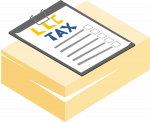Taxation Benefits for LLCs Started in Illinois
By default, limited liability companies in Illinois are taxed as pass-through entities.The LLC as an entity doesn’t pay taxes. Instead, the profits (or losses) from the LLC pass-through to the tax returns of the members. Each member of the LLC pays self-employment taxes (12.4%for Social Security and 2.9% for Medicare) on their share of the LLC's profits. LLC members will also need to pay Illinois state income tax (4.95%). We go over other taxes your Illinois LLC may be obligated to pay.
In this article, we'll cover:


How are Illinois LLCs taxed?
A single-member LLC (SMLLC) is taxed as a sole proprietorship by default. A multi-member LLC is taxed as a partnership by default. To file federal taxes as either type of LLC, you need to file one of these forms:
- Single-member LLC—Form 1040 (usually Schedule C, but some SMLLCs file C-EZ, E, or F)
- Multi-member LLC—Form 1065
An Illinois LLC can also elect to be taxed as an S-corp or C-corp. We’ll explain what that means for your LLC’s taxes.
Illinois LLCs taxed as S-corp
Illinois LLCs have the option of electing to be taxed as S-corps. Like regular LLCs, S-corps are taxed as pass-through entities. Whereas the profits from an LLC are distributed in a lump sum, S-corps can distribute profits as dividends and as a reasonable salary. While the salary payments will need to pay the self-employment taxes (15.3%), the dividends can remain untouched. In order for your LLC to be taxed as an S-corp, you’ll file Form 2553 with the IRS.
To elect S-corp taxation, your LLC will need to meet certain IRS requirements. It’s also a good idea to consult with a CPA to see if it makes sense for your LLC to choose S-corp status. S-corp tax filings are a bit more complicated than regular LLC filings, but in some cases the tax savings may be worth the extra work. S-corps report their income to the IRS by filing Form 1120-S.
LLCs taxed as C-corp
The C-corp is the default tax status for corporations, and while it’s not nearly as common for an LLC to elect C-corp status, LLC owners may find that they can benefit from being taxed as a C-corp. C-corps are generally eligible for more tax deductions than regular LLCs. They’re also more attractive to investors. C-corps need to file Form 1120 with the IRS, and they’ll have to pay the 21% federal corporate income tax along with the 9.5% Illinois corporate tax.

Illinois State Income Tax
If you’re filing under either default LLC or S-corp status, you’ll pay individual income tax in Illinois which is a flat 4.95%. This means whether you earn $100 or $100,000 in income from your LLC, you’ll pay the same rate. While the LLC itself won’t pay taxes, each member will still need to file Form IL-1040 to report their income to the state. Also, if the LLC is taxed as a C-corp, each member will need to pay the Illinois corporate income tax (9.5%) and file Form IL-1120.

Sales and Use Tax
Every business that engages in business activity in Illinois is required to obtain a Certificate of Registration or a License, which is a long name for a sales and use tax. This license allows your business to collect the 6.25% state sales tax. The fastest and easiest way to get your license is to register online at MyTaxIllinois or fill out a and mail a Business Registration Application (Form REG-1). The 6.25% tax that your business collects from customers will need to be paid to Illinois on a quarterly basis.

Local Illinois Taxes
While Illinois has a 6.25% sales tax on all retail goods and services sold in the state, each municipality can add a local sales tax as well to any sales. For example, Chicago levies an additional 4% sales tax on all sales, while Joliet only collects an additional 2.5%. Some counties, like Addieville, collect no local sales tax. Your LLC will be required to collect these local sales taxes, as well as the state sales tax, and remit them to the appropriate authorities.

Other Taxes in Illinois
Now that you’ve had a chance to read over federal, state, and local tax requirements, here are a few other taxes that your LLC may face in Illinois.
Illinois State Employer Taxes
You’ll need to budget for unemployment insurance and workers’ compensation taxes if your LLC has employees:
- Unemployment Insurance (UI) Tax— UI rates can increase or decrease based on economic conditions. When unemployment is low, more businesses are paying into the state fund, which means tax rates generally drop. When unemployment rates go up, there are more people to pay out, and rates will rise. As of 2022, Illinois’s unemployment insurance tax rates range from 0.525% to 7.1%.
- Workers’ Compensation— Workers’ compensation insurance covers medical expenses and replaces income for employees who are injured on the job. Though Illinois does allow for some worker exemptions (LLC members, sole proprietors, and corporate officers), in most cases, if your LLC has even one full- or part-time employee, you’ll be required to obtain workers’ compensation insurance. Rates are based off the type of work your LLC does and how many employees are being covered.
To learn more about the taxes an Illinois LLC may encounter, visit the Illinois Department of Labor website.
Industry Taxes
Federal, state, and local taxes aren’t the only taxes your LLC will need to pay attention to. Illinois Department of Revenue has a laundry list of industry-specific taxes that may affect your bottom line:
- Cigarette Use Taxes
- Coin-Operated Amusement Device Tax
- Dry-Cleaning License Tax
- Electricity Distribution/Invested Capital Taxes
- Electricity Excise Tax
- Energy Assistance Taxes
- Renewable Energy Taxes
- Gas Tax/Gas Use Tax
- Hotel Operators’ Occupation Tax
- Illinois Sports Facilities Hotel Tax
- Metropolitan Pier and Exposition Authority Hotel Tax
- Municipal Hotel Tax (Chicago)
- Parking Excise Tax
- Qualified Solid Waste Energy Facility Payments
- Telecommunications Tax

Do foreign LLCs in Illinois need to pay Illinois taxes?
Yes. An Illinois foreign LLC can expect to be taxed just like a domestic Illinois LLC. Foreign LLCs are LLCs formed outside of Illinois that have registered to do business in the state. This means that a foreign LLC in Illinois will be expected to register to collect Illinois sales tax, as well as pay taxes on any income earned in Illinois. You’ll want to check with the local government office in the jurisdiction where your foreign LLC operates to see if you need to register for any applicable local taxes.





